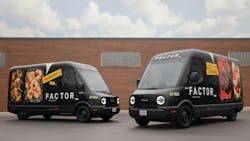HelloFresh partners with Rivian, Ryder to roll out EVs
By adding 70 Rivian electric Commercial Vans to its Factor fleet, HelloFresh has reduced its CO2 output by 200 tonnes, or the equivalent to the carbon sequestered in 300 acres of U.S. forest, the company announced. The Factor brand delivers prepared meals, while Hello Fresh focuses on meal prep kits.
“By adding the Rivian Commercial Van into our fleet, not only have we cut our CO2 emissions, but we also play our role in helping to clean the air in the cities in which we operate,” said Nunzio Di Savino, VP, US Logistics for HelloFresh.
The Rivian vans, which have a range of up to 160 miles, and HelloFresh has used them in 14 markets to travel 250,000 miles. Hello Fresh estimated they saved about 20,000 gallons of gas by switching to electric.
The vans, now featuring Factor branding (they were unbranded for the last few months), are are being rolled out in 14 HelloFresh transit hubs that are close to major city centers. Hello Fresh leadership has set a goal of 25% of its fleet to be electric. The company has also eliminated diesel powertrains from its fleet.
"We have found huge advantages to running an EV fleet," explained Ben Kubik, senior program manager of last-mile logistics at HelloFresh. "For example, the cost of fuel on an EV is stable and takes out the guesswork in our financial forecasting. We are also interested in the lower long-term maintenance costs an EV promises over a traditional commercial van."
Ryder and its RyderElectric+ solution are providing advisory, leasing, and maintenance services.
Additionally, HelloFresh has paired its acquisition with optimized driving routes for its last-mile delivery network, allowing it to decrease distances driven and transit time, reduce packaging, and the overall weight for each box.
"The Rivian Commercial Van’s range opens up an entirely new set of delivery routes, which we weren’t able to accomplish with our previous electric vehicles," Kubik said. "The Rivian Commercial Van is also purposefully built for last mile delivery, so we can avoid things like turning the vehicle on and off 100+ times a day, manually sliding the side door of a cargo van the same amount, or getting stuck in traffic idling and wasting gasoline."
The deployment took over year of planning, Kubik said. This included figurign out how to install 100 charging station.
"There’s a lot of planning, budgeting, approvals, and construction to build the infrastructure necessary to incorporate EVs in a fleet," Kubik said. "Having our own charging infrastructure means we can charge our fleet in the most efficient way possible—overnight at our warehouse when the vans are not in use.
